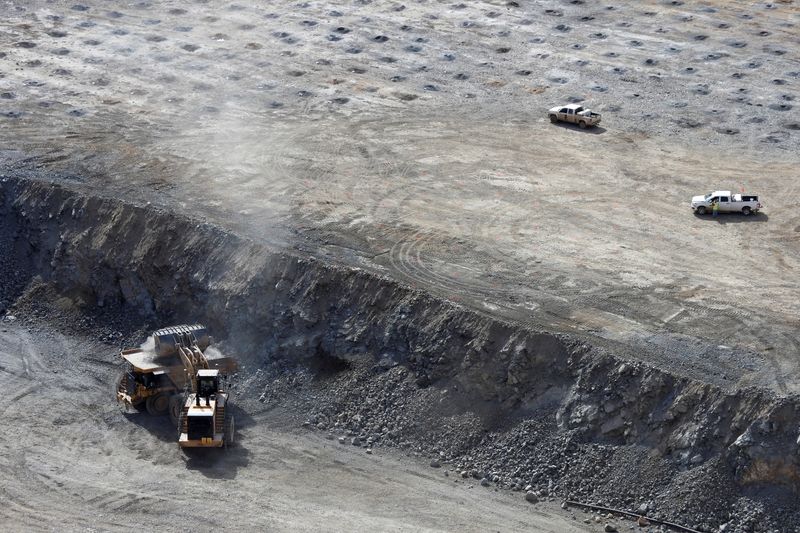By Nick Carey and Christina Amann
LONDON/BERLIN (Reuters) - The auto industry's drive to make electric vehicle motors with little to no rare earth content has hit high gear, with European, U.S. and Japanese automakers and suppliers racing for alternatives in an area dominated by China.
Automakers have mostly relied on motors with rare earth-based permanent magnets, which have been the most efficient at providing the torque to power EVs.
But different types of motors without permanent magnets that were previously too big and too inefficient, or those with greatly-reduced rare earth content have become commercially viable, prompting the rush for alternatives.
Market leader Tesla (NASDAQ:TSLA) garnered headlines earlier this year saying it would cut rare earths from its next-generation EVs.
But automakers from General Motors (NYSE:GM) to Jaguar Land Rover (JLR) and major suppliers like BorgWarner (NYSE:BWA) are researching, or have developed, motors with low- to zero-rare earth content such as magnet-free externally excited synchronous machines (EESMs), which generate a magnetic field using electric current.
Others like Nissan (OTC:NSANY) are going further than previously reported, with a dual strategy to develop both newer EESM motors and also to develop permanent magnet motors where the rare earth content will be gradually eliminated altogether.
China dominates the mining and processing of a group of 17 metals known as rare earths, though companies elsewhere are trying to loosen China's grip.
Recent Chinese restrictions on exports of gallium and graphite - which is critical for EV production - highlighted the risk of over-reliance on China.
German supplier ZF has developed an EESM motor that Chief Technology Officer Otmar Scharrer said matches the size and performance of permanent magnet motors.
"This is an important contribution to making us a little more independent of China," he said.
ZF is in talks with U.S., European and Chinese automakers to supply the motor and could be in production model EVs within two years, Scharrer said.
Aside from over-reliance on China, refining rare earths, such as neodymium and dysprosium, involves solvents and toxic waste that conflict with sustainability goals.
"If you get it right, you've got a much more sustainable product," Ben Chiswick, director of engineering business development at Detroit-based Drive System Design, which is developing rare earth-free motors with three automakers.
Some automakers, like BMW (ETR:BMWG) say they are already there after years of research.
"It was not a home run... but it works very well without rare earths" said Uwe Deuke, the engineer in charge of developing BMW's EESM motor for its next-generation EVs.
'WAITING IN THE WINGS'
The average EV permanent magnet motor uses around 600 grams (1.32 lb) of heavy rare earth neodymium. Prices have fluctuated greatly for neodymium - at around $125/kg now, it is down from a peak of around $223 last year, but well above $65 in 2020.
Vitesco designed an EESM motor for Renault (EPA:RENA) and has a new version coming in 2026. Gerd Roesel, innovation head at the German supplier's electrification division, said rare earth-free alternatives avoid those wild price swings.
Others like U.S. startup Niron Magnetics are developing permanent magnets without rare earths.
Tesla's announcement on dropping rare earths "opened up buyers' eyes to the fact that you don't really need rare earths to make EV magnets," Niron CEO Jonathan Rowntree said.
Niron's latest funding round included investments from GM and Stellantis (NYSE:STLA).
Nissan uses an EESM motor in its Ariya crossover. Shunji Oki, expert leader at the automaker's powertrain and EV engineering division, said Nissan is developing both better EESM motors and permanent magnets where rare earths will be phased out.
James Edmondson, an analyst at consultancy IDTechEx, said automakers rushed to find alternatives as rare earth prices rose, but now prices have fallen they are watching China closely and waiting to see if governments take action that would curb the use of Chinese rare earths, as the U.S. Inflation Reduction Act did.
"This is why they (automakers) have other technologies waiting in the wings," he said.
IDTechEx forecasts that as of now rare-earth permanent magnet motors will lose some global market share over the next decade but still make up more than 70% as Chinese EV makers face no pressure to curtail their use - though their share will be much closer to 50% in Europe, Edmondson said.
And where western automakers are sticking with rare-earth permanent magnets, they are working to dramatically reduce their content, he added.
Mercedes-Benz (OTC:MBGAF)'s next-generation EV platform, for instance, has almost no heavy rare earth content.
The challenge also goes beyond motors.

In some EVs, around a third of the rare earths used are in the sound system's speakers. UK firm Warwick Acoustics has developed rare earth-free speakers that are 90% lighter and more energy efficient than conventional ones. It has signed up its first luxury automaker customer and is talking to others, CEO Mike Grant said.
"We're fighting off people right now," he said.